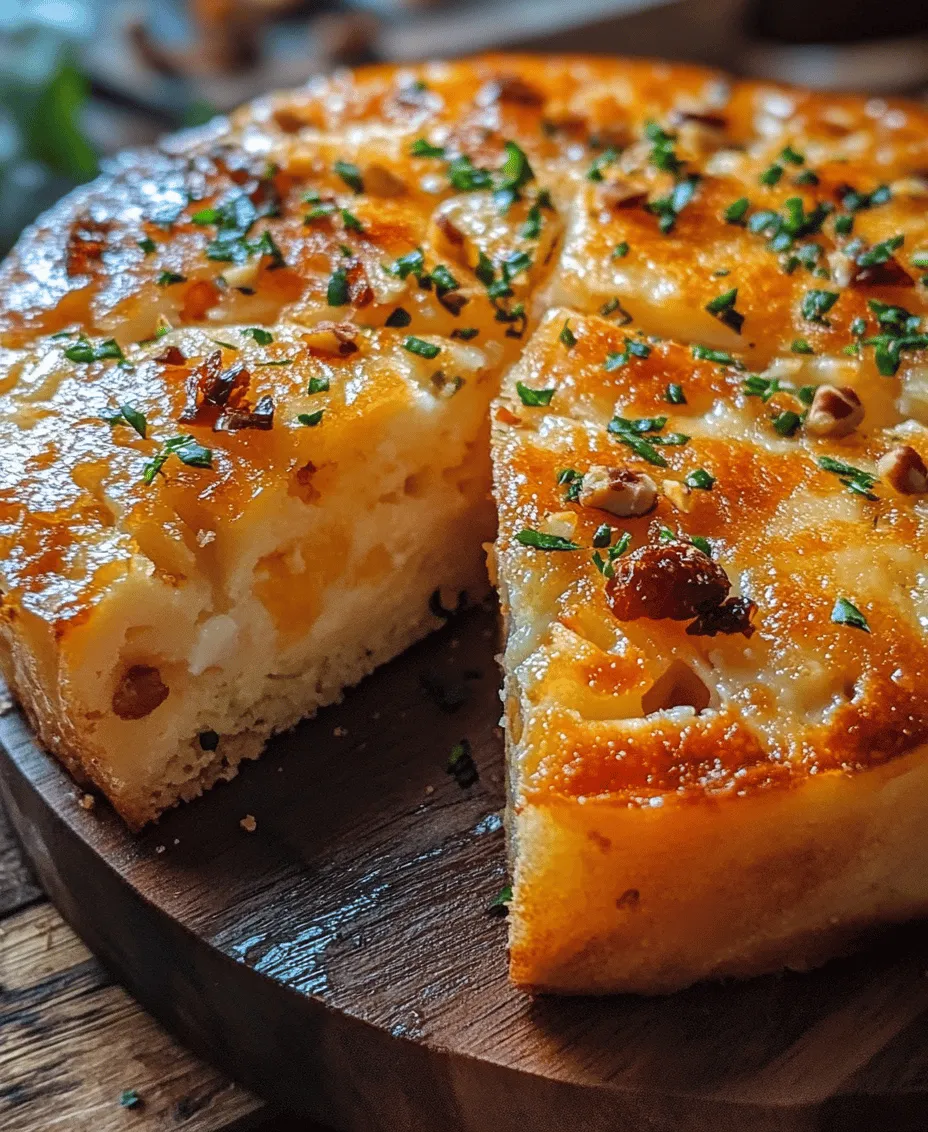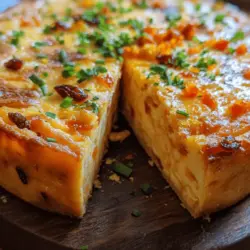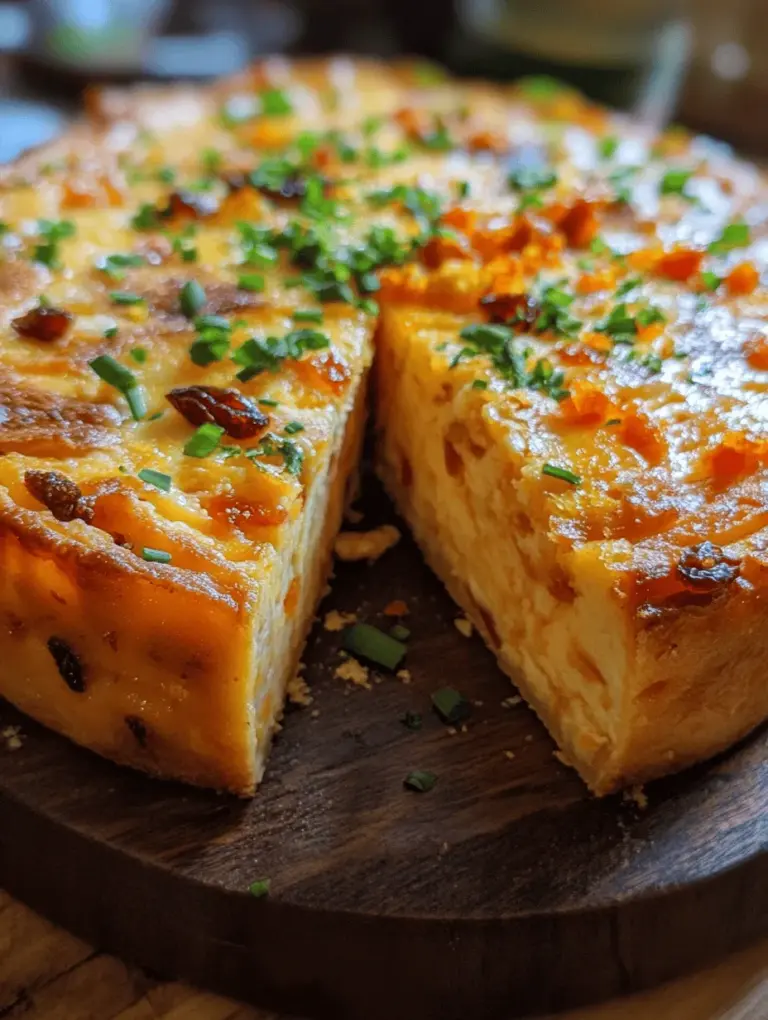Introduction
Fluffy Chinese Egg Cake, also known as “Ji Dan Gao,” is a delightful treat that has captured the hearts of many across Asia and beyond. This cake is not only a staple in Chinese households but also holds cultural significance during various celebrations, including birthdays and festivals. Traditionally served as a symbol of good luck and prosperity, the Fluffy Chinese Egg Cake is a beautiful representation of the simplicity and elegance found in Asian desserts.
What sets this cake apart is its ethereal texture, which is light and fluffy, almost reminiscent of a soufflé. The delicate sweetness combined with a hint of egg flavor creates a unique taste experience that is both comforting and satisfying. Its subtle flavors make it a versatile dessert that can be enjoyed on its own or served with a variety of accompaniments, such as fresh fruits or a drizzle of syrup.
One of the most appealing aspects of this recipe is its simplicity. Home bakers of all skill levels can create this delicious cake with minimal ingredients and equipment. The straightforward process ensures that anyone can enjoy the satisfaction of baking a fluffy, impressive cake without the need for advanced techniques or specialized tools.
Understanding the Ingredients
To create the perfect Fluffy Chinese Egg Cake, it is essential to understand the role of each ingredient in the recipe. The key ingredients include eggs, granulated sugar, milk, vegetable oil, all-purpose flour, baking powder, and salt. Each component contributes to the cake’s signature texture and flavor profile.
Eggs
At the heart of this recipe are the eggs, which play a crucial role in providing structure and fluffiness. When eggs are beaten, they trap air, creating a light and airy batter. This process is vital for achieving the desired rise in the cake during baking. The proteins in the eggs coagulate as the cake cooks, helping to set the structure and maintain the cake’s fluffy texture.
Granulated Sugar
Sugar is not just for sweetness; it also stabilizes the batter and helps create a tender crumb. When sugar is gradually incorporated into the beaten eggs, it dissolves and creates a viscous mixture that contributes to the cake’s moistness. The sugar also caramelizes slightly during baking, adding depth to the flavor profile.
Milk and Vegetable Oil
Both milk and vegetable oil are essential for adding moisture and richness to the cake. Milk enhances the flavor while also creating a tender texture, which is crucial for maintaining the cake’s fluffiness. Vegetable oil, on the other hand, provides a lightness that helps prevent the cake from becoming dense. The combination of these two ingredients ensures that the Fluffy Chinese Egg Cake remains moist and flavorful.
All-Purpose Flour, Baking Powder, and Salt
All-purpose flour serves as the backbone of the cake, giving it structure. The gluten formed during mixing helps to hold the cake together while still allowing it to remain light. Baking powder acts as a leavening agent, creating pockets of air that contribute to the cake’s rise. Salt, though used in small quantities, enhances the overall flavor and balances the sweetness of the cake.
Optional Garnishes: Nuts and Dried Fruits
While the Fluffy Chinese Egg Cake is delightful on its own, adding garnishes such as chopped nuts or dried fruits can elevate it to the next level. These additions provide texture and visual appeal, making the cake even more enticing. Nuts, such as walnuts or almonds, offer a crunchy contrast to the soft cake, while dried fruits like raisins or cranberries introduce a burst of sweetness.
Preparation Steps Explained
Now that we have a clear understanding of the ingredients, let’s dive into the preparation steps for creating your own Fluffy Chinese Egg Cake. Each step is designed to maximize the cake’s fluffy texture and ensure a delicious result.
Step 1: Preheat the Oven and Prepare the Cake Pan
Before you start mixing your ingredients, preheating your oven is crucial. Set it to 350°F (175°C) to ensure that it reaches the proper temperature by the time you are ready to bake. While the oven is warming up, prepare your cake pan. A round 8-inch cake pan is ideal for this recipe. Grease the pan lightly with vegetable oil or butter and line the bottom with parchment paper for easy removal after baking.
Step 2: Beat the Eggs
In a large mixing bowl, crack the eggs and begin beating them with an electric mixer or a whisk. The goal is to achieve a light and frothy consistency. This process usually takes about 5-7 minutes. As you beat the eggs, you will notice them expanding in volume, which is a sign that they are incorporating air effectively.
Step 3: Gradually Incorporate the Sugar
Once the eggs have reached a frothy state, gradually add the granulated sugar while continuing to beat the mixture. It’s important to add the sugar slowly, as this allows it to dissolve evenly into the eggs. Continue beating until the mixture becomes thick and pale in color, which indicates that the sugar has been fully incorporated and the eggs have reached the desired volume.
Step 4: Mix in Milk and Oil
With the egg and sugar mixture ready, it’s time to add the milk and vegetable oil. Pour the milk and oil into the bowl, and mix on low speed until combined. This step is essential for adding moisture to the batter without deflating the air that has been incorporated into the eggs.
Step 5: Sift and Fold in Dry Ingredients
In a separate bowl, sift together the all-purpose flour, baking powder, and salt. Sifting is important as it aerates the flour and removes any lumps. Gradually fold the dry ingredients into the wet mixture using a spatula or wooden spoon. Be gentle during this step to maintain the airiness of the batter; over-mixing can lead to a dense cake.
Step 6: Pour and Smooth the Batter into the Pan
Once the dry ingredients are fully incorporated, it’s time to pour the batter into the prepared cake pan. Use a spatula to smooth the top and ensure that the batter is evenly distributed. This step is crucial for even baking and achieving a flat top on your cake.
Step 7: Bake the Cake
Carefully place the cake pan in the preheated oven and bake for approximately 25-30 minutes, or until the cake is golden brown and a toothpick inserted into the center comes out clean. Avoid opening the oven door during the first 20 minutes of baking, as this can cause the cake to collapse.
Step 8: Cool and Serve
Once baked, remove the cake from the oven and allow it to cool in the pan for about 10 minutes before transferring it to a wire rack to cool completely. This will help prevent the cake from becoming soggy. Once cooled, you can serve it as is or with your choice of garnishes.
In this section, we explored the delightful journey of making a Fluffy Chinese Egg Cake, examining the essential ingredients and the preparation process. The balance of flavors and textures makes this cake a beloved delicacy, perfect for any occasion. As you continue through this recipe, you will discover just how easy it is to create a cake that is not only delicious but also a true testament to the beauty of Chinese cuisine.

Baking the Cake
To achieve a perfect Fluffy Chinese Egg Cake, it is essential to set the optimal baking conditions. Preheat your oven to 350°F (175°C). The right temperature is crucial as it allows the cake to rise properly without becoming too dense or dry. Place the rack in the center of the oven to ensure even heat distribution.
Indicators of Doneness: Visual Cues and Toothpick Test
As the cake bakes, keep an eye on it to catch the signs of doneness. After about 25-30 minutes, look for a golden-brown top that springs back when lightly pressed. Additionally, the edges should start to pull away from the sides of the pan, indicating that the cake is nearing completion.
To perform the classic toothpick test, insert a toothpick into the center of the cake. If it comes out clean or with just a few crumbs attached, your Fluffy Chinese Egg Cake is ready. If it comes out wet or covered in batter, give it another 5-10 minutes in the oven, checking periodically. Remember that every oven is different, so the baking time might vary slightly.
The magic of baking transforms the batter into a light, fluffy cake through a process called leavening. The air bubbles created in the batter expand when heated, causing the cake to rise. This reaction is enhanced by the whipped egg whites, creating a delicate structure that makes the cake airy and spongy. The sugar caramelizes slightly on the surface, providing that lovely golden hue, while the moisture from the eggs keeps the cake tender.
Cooling and Serving the Cake
Once your Fluffy Chinese Egg Cake is out of the oven, allow it to cool in the pan for about 10 minutes. This step is crucial as it helps the cake set and makes it easier to remove from the pan without breaking. After 10 minutes, gently run a knife around the edges of the cake and invert it onto a wire rack to cool completely. Cooling on a wire rack prevents the bottom from becoming soggy, allowing air to circulate.
Suggestions for Presentation: Garnishing with Nuts or Dried Fruits
For a delightful presentation, consider garnishing your cake with toasted nuts or dried fruits. Slices of almonds or walnuts sprinkled on top add a pleasant crunch, while dried fruits like raisins or goji berries can introduce a burst of color and texture. For a more elegant touch, dust the top with powdered sugar or a light drizzle of honey. You might also consider serving the cake with a side of whipped cream or a scoop of vanilla ice cream to elevate the dessert experience.
Pairing Recommendations: Beverages that Complement the Egg Cake
When it comes to beverages, several options pair beautifully with the Fluffy Chinese Egg Cake. A cup of traditional Chinese tea, such as oolong or jasmine, provides a fragrant and refreshing contrast to the sweetness of the cake. Alternatively, a light, fruity white wine or sparkling water infused with citrus can enhance the flavors without overwhelming them. For a more casual setting, a chilled glass of lemonade or iced tea also complements the cake’s lightness.
Cultural Significance of Chinese Egg Cake
The Fluffy Chinese Egg Cake holds a special place in the hearts of many, with a rich history rooted in Chinese culture. Originally enjoyed as a street food, this cake has become a beloved treat in households and bakeries throughout China. Its simplicity and delightful texture make it a favorite among both children and adults alike.
How This Cake Fits into Festive Celebrations and Everyday Life
Traditionally, egg cakes are served during festive occasions such as Chinese New Year, family gatherings, and birthdays. They symbolize good luck and prosperity, making them an essential part of celebratory meals. However, their light and fluffy nature also makes them a suitable everyday snack or dessert, enjoyed alongside tea or coffee during family gatherings or casual visits with friends.
Personal Anecdotes or Stories About Enjoying Egg Cake in Various Contexts
Many fond memories are tied to the enjoyment of Fluffy Chinese Egg Cake. Some may recall the warmth of family kitchens where the aroma of baking filled the air, or the joy of sharing a slice with loved ones during festive meals. Stories of children eagerly awaiting their turn to taste the cake, or friends gathering to enjoy it over cups of tea, all highlight the cake’s role as a cherished treat that brings people together.
Variations of the Fluffy Chinese Egg Cake
While the classic Fluffy Chinese Egg Cake is a delight on its own, there are numerous creative twists to explore. Feel free to experiment with different flavors and ingredients to create a personalized version that suits your taste.
Creative Twists on the Classic Recipe
1. Matcha Egg Cake: Add 2-3 tablespoons of matcha powder to the flour mixture for a unique flavor and vibrant green color.
2. Chocolate Egg Cake: Incorporate 1/2 cup of cocoa powder into the dry ingredients for a rich chocolate version that appeals to cocoa lovers.
3. Citrus Zest: Enhance the flavor by adding the zest of one lemon or orange to the batter, providing a refreshing and zesty twist.
Gluten-Free Alternatives Using Almond or Coconut Flour
For those with gluten sensitivities, you can create a gluten-free version of the Fluffy Chinese Egg Cake using almond or coconut flour. Keep in mind that these substitutes may require slight adjustments in the liquid ratios, as they absorb moisture differently than traditional flour. Start by replacing half the all-purpose flour with almond flour or coconut flour and see how it affects the texture. You may need to experiment a bit to find the perfect balance.
Ideas for Seasonal Variations: Pumpkin Spice in the Fall, Fruity Flavors in Summer
Embrace the changing seasons by incorporating seasonal flavors. In the fall, consider adding pumpkin puree and warming spices like cinnamon and nutmeg to create a pumpkin spice egg cake. During the summer, fresh fruits such as mashed bananas or pureed strawberries can add natural sweetness and moisture. These variations not only celebrate the ingredients available throughout the year but also keep the recipe exciting and fresh.
Conclusion
Making a Fluffy Chinese Egg Cake is a delightful culinary adventure that combines simplicity with the joy of baking. This cake’s airy texture and delicate sweetness make it a versatile treat for any occasion, from festive celebrations to everyday family meals.
As you explore this recipe, consider experimenting with different flavors and variations to find your perfect version. This cake has the potential to become a family favorite, bringing loved ones together around the table.
In both culinary and cultural contexts, the Fluffy Chinese Egg Cake holds a special significance. It is a testament to the beauty of traditional recipes that continue to be cherished through generations. So, gather your ingredients, roll up your sleeves, and embark on the journey of making this delightful cake that is sure to bring smiles and satisfaction to all who share it.


